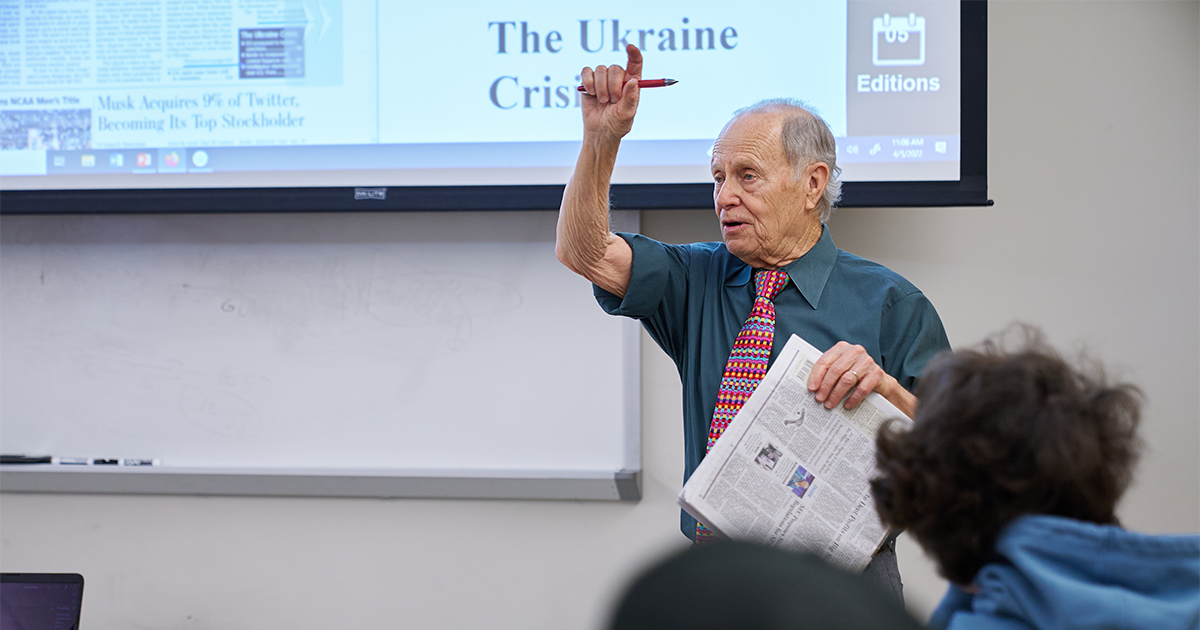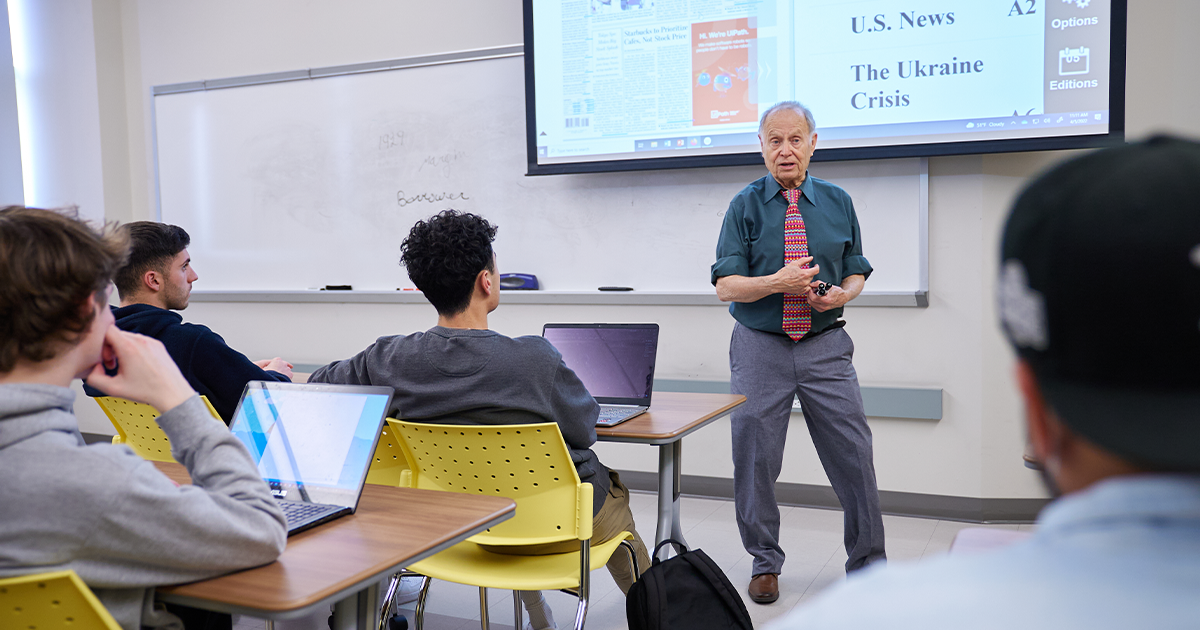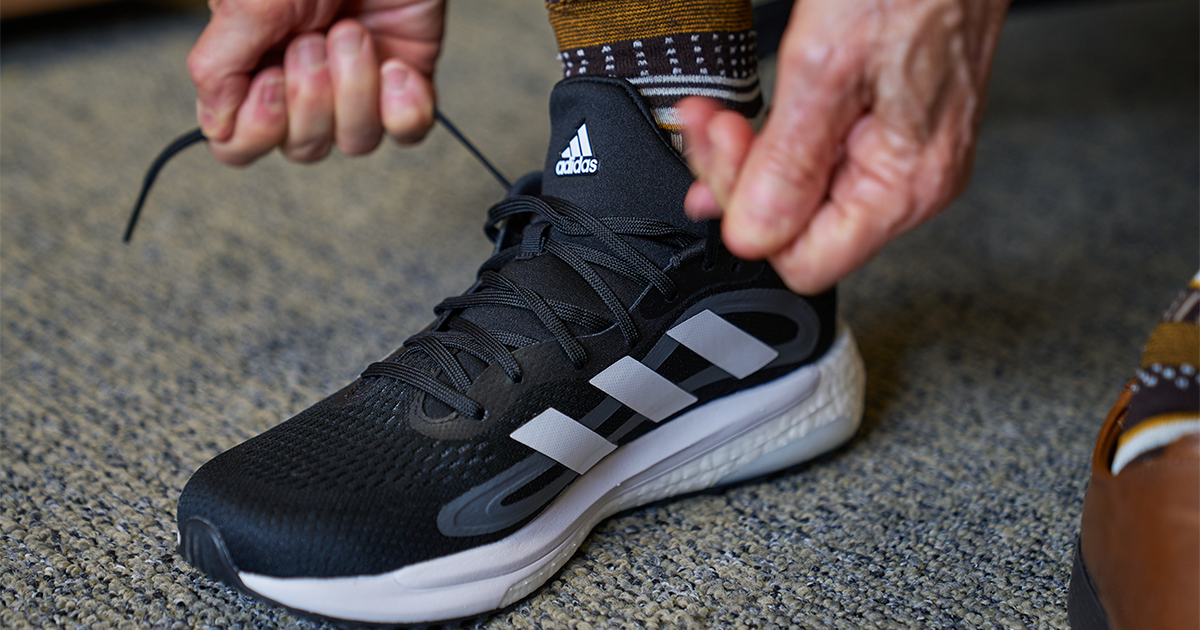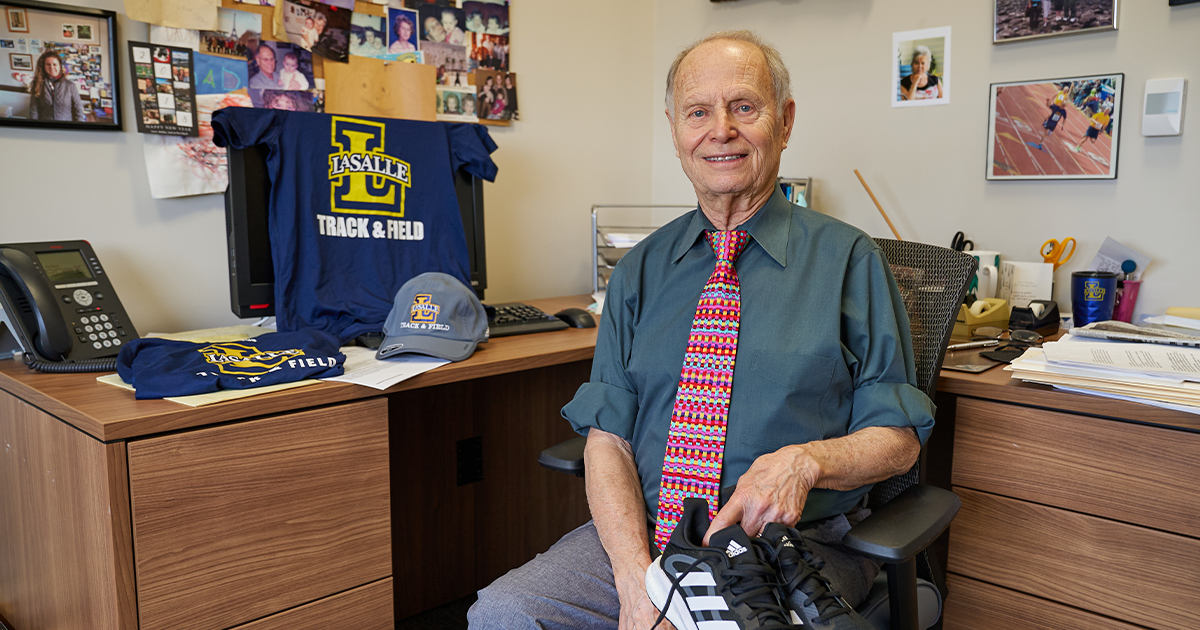La Salle University
La Salle finance professor, at nearly 85 years old, is off and running
Joshua Buch, Ph.D., will compete in the masters’ 100-meter dash at Penn Relays for the sixth time.
For Joshua Buch, Ph.D., this was shaping up as just another tennis match. There was nothing out of the ordinary—except for Buch’s cross-court conversation with another player.
“The guy said, ‘I never saw anyone run like you. How old are you?’ I told him I was 76, and that was some years ago,” said the nearly 85-year-old Buch, a professor of finance in La Salle University’s School of Business. “He looked at me. He just couldn’t believe it. He said, ‘You know, there are races at Penn Relays for runners like you.’”
Penn Relays? Really?
Buch stays fit, but he isn’t a runner. (“The last time I ran,” Buch said, “was 1954 and I was a senior in high school.”) And he certainly didn’t think he ever would be running at Penn Relays—the nation’s oldest and largest track-and-field competition.
Curious, though, Buch looked into it. And sure enough, he began reading about the masters events, those reserved for runners 75 years and older. One event in particular, the 100-meter dash, caught his eye. “I remember thinking, ‘OK, how do I sign up?’” Buch said, chuckling.
“I’m not just teaching students about finance; I’m teaching them about life. I don’t need to win anything. I’m a winner just being there.”
— Joshua Buch, Ph.D.
That was Buch’s introduction to Penn Relays, which are scheduled for April 28–30 at the University of Pennsylvania’s Franklin Field. This year’s Penn Relays represent Buch’s sixth appearance and his first since 2019. (Organizers cancelled the 2020 and 2021 events due to the COVID-19 pandemic.)
Buch maintains modest goals for the 100-meter dash: have fun and finish the race injury-free. No matter how he runs, it is sure to be an electric environment.
“The organizers schedule (masters events) on Saturday afternoon, just before the main events with some of the best competitors in the world lining up,” said La Salle’s Tom Peterson, who coaches the men’s and women’s track and field teams. “Thousands of people are stuffed into Franklin Field to see these professionals and Olympic champions. And they are screaming at the tops of their lungs.”
“My theory is the whiter the runners’ hair, the more cheering you get,” said Phil Felton, a masters runner who has coordinated Penn Relays’ masters events since 2006.
Getting started
That first year provided Buch with an unexpected challenge. Unaffiliated with a running club, he would need to provide evidence to Penn Relays organizers that he could complete the 100-meter dash in a reasonable time. He didn’t have results from past races to show. So he asked Peterson for help.
“He walked into my office one day and said, ‘Can you help me get into the old-fogey 100-meter run?’” Peterson said. “I’ll never forget that.”
Peterson offered to hand-time Buch on the track at La Salle’s McCarthy Stadium. He even provided Buch with a pair of running shoes and a La Salle running shirt. The result? After two tries, Peterson clocked the professor at 18.2 seconds.
Peterson wrote a letter for Buch, who mailed it to Penn Relays officials. They called with good news: Buch had been accepted to compete.
“One of the first applications I receive each year is Josh’s,” said Felton. “He’s very enthusiastic.”
With so many applicants for the masters events in 2015, Buch’s first year, organizers created a second heat… which Buch won.
“I looked around and said, ‘Oh, I can win this!’” Buch said. “I slowed down toward the end. This one official comes up to me and said, ‘We were suspicious at first, but you proved yourself.’ I typically end up in the middle because these other people are real runners. I don’t practice running.”
Getting ready for race day
Buch’s preparation is a bit unorthodox. Like he said, he doesn’t train for Penn Relays.
He has his reasons why. First, he said, he never stops moving around the classroom as a 51-year professor at La Salle. He also plays tennis twice each week and visits a community center near his home to exercise “a bit more than usual” as the race approaches, he said.
As for his race day routine, Buch said it starts with a good breakfast. An omelet and avocado toast are his go-to. Another ritual is to ride a train into 30th Street Station and walk a half-dozen blocks with his family to Penn’s campus, where he earned his doctorate. After running, he said, the family takes Buch into Center City for a celebratory dinner. Buch’s April 30 race at Penn Relays nearly coincides with his 85th birthday, two days earlier on April 28.
Getting to know Dr. Buch
Buch arrived at La Salle a half-century ago, in September 1971—13 years before the institution received its university status. In that time, the School of Business has changed buildings on campus. Faculty colleagues have come and gone. Thousands of students have led (and, in some cases, retired from) productive careers.
It’s even long enough ago that he’s educated three generations of students within a handful of La Salle legacy families, said Jan Ambrose, Ph.D., professor and chair of the University’s finance department.
Students appreciate Buch equally for his personality and his technical know-how, Ambrose added. “His energy level makes him special,” she said. “He takes considerable pride in getting to know his students on a personal level, work with them outside the classroom, and see their success over the long run.”
As has been the case in past years, Buch has no rosy expectations of winning gold at this year’s Penn Relays. The joy he gets from his classroom work with students is sufficient.
“I’m not just teaching students about finance; I’m teaching them about life,” he said. “I don’t need to win anything. I’m a winner just being there.”
—Christopher A. Vito



